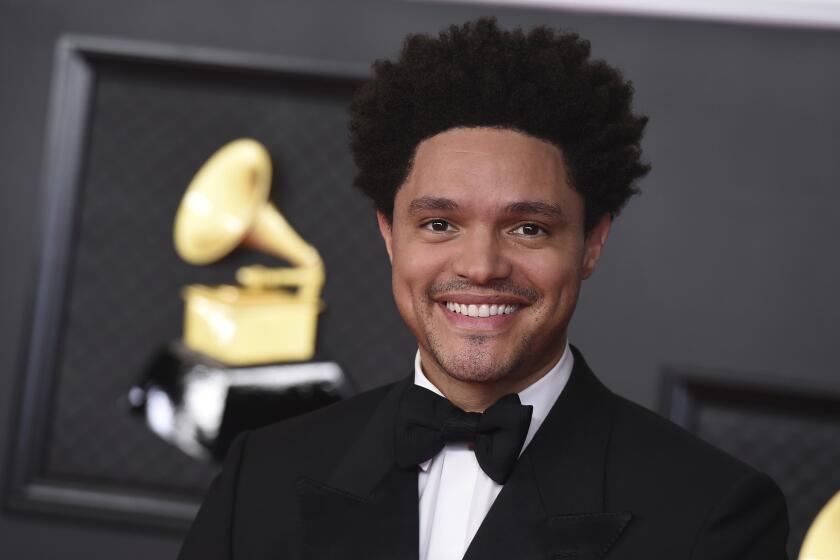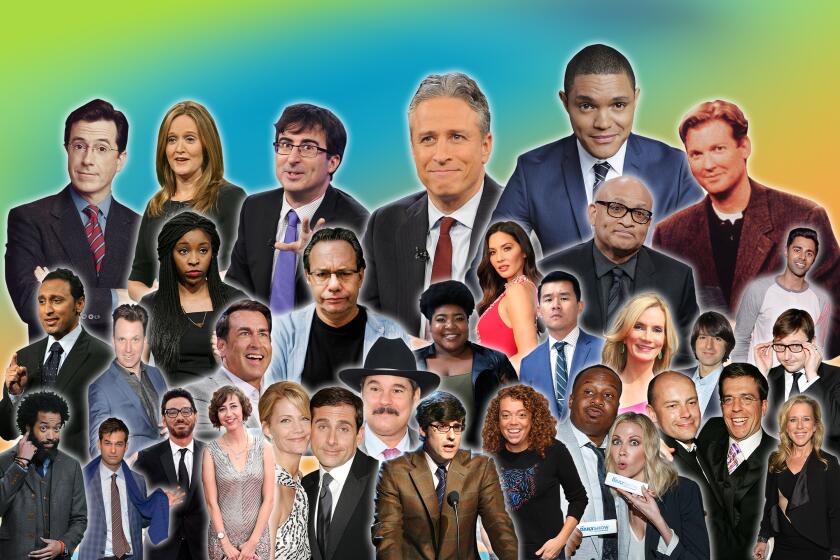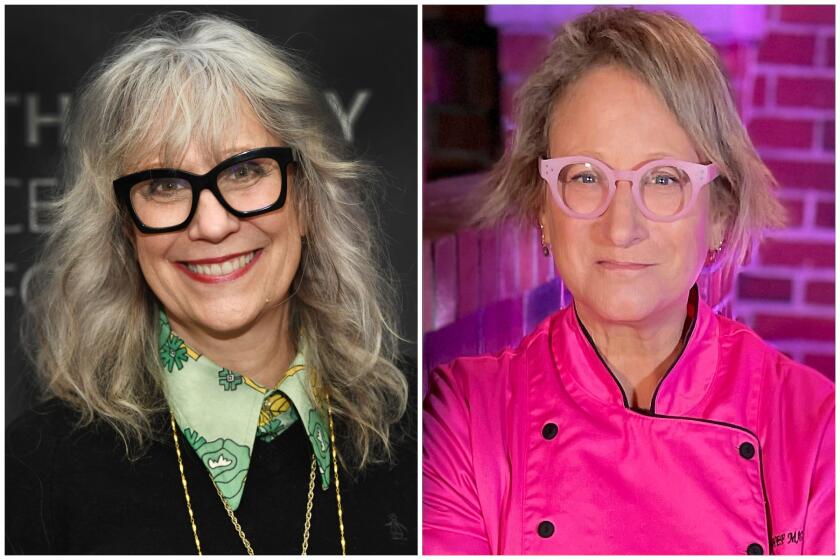Trevor Noah’s exit won’t just hurt ‘The Daily Show.’ It’ll hurt all of late night

Late-night television and nightly political satire will miss “The Daily Show” host Trevor Noah, who announced Thursday that he’s exiting the Comedy Central series after seven years behind the desk. The South African comedian brought “third world” perspective — his words — to a talk-show circuit populated with white American and Anglo jokesters. Noah’s outsider status, initially considered a drawback in his line of work, eventually became his greatest strength. By connecting us with the rest of the world during an incredibly fraught time in American politics, the comedian reminded his audience that we weren’t the first to experience such upheaval, and we weren’t alone. His sharp and knowing commentary about global affairs, foreign conflict, colonialism and the realities of race and inequality both inside and outside the U.S. somehow made our own spiraling state of the union feel a little less catastrophic.
“I’ve loved trying to find a way to make people laugh, even when the stories are particularly s—, even on the worst days,” he told the audience at Thursday’s “Daily Show” taping. But the global exposure that forged his comedic style is also at least part of why he’s decided to depart — at a date still to be determined, according to the network. “I spent two years in my apartment, not on the road, and when I got back out there, I realized there’s another part of my life out there that I want to carry on exploring. I miss learning other languages. I miss going to other countries and putting on shows,” Noah said. He thanked Comedy Central for believing in “this random comedian nobody knew on this side of the world.”
Noah, who grew up in Johannesburg and made a name for himself in the region as a stand-up, was a relatively obscure choice to follow predecessor Jon Stewart, and the series initially suffered in the ratings when Noah took the reins in 2015. But the gamble paid off: The former “Daily Show” correspondent amassed younger viewers during a particularly rocky time, in part by underscoring how his perspective contrasted with competitors such as Stephen Colbert, Seth Meyers, John Oliver, Samantha Bee, James Corden and Jimmys Kimmel and Fallon. He’d only been in the seat a year when Trump won the presidency; he pivoted to streaming the show from home, in a black hoodie, during the pandemic. But he made unpredictable times feel less doomy and isolating by combining news of domestic strife with happenings beyond our borders.
Trevor Noah debuted as host of ‘The Daily Show’ in 2015, taking over for former host Jon Stewart. After seven years, he said he’s ready to move on.
In a recent “Royal Rumble” segment, for instance, he joked about the varying reactions to Queen Elizabeth II’s death. It’s normal to mourn someone’s passing, he said, but there’s a problem in demanding that everyone feel the same way about the crown. He said her passing gave insight into how people see the world around them and noted the outrage of royal supporters who demanded everyone show the same reverence for the monarchy as they did. He pointed out that folks from places like India and Africa suffered under the British Empire, throughout which British colonizers discouraged them from speaking in their native languages and disregarded local customs. “You can’t expect people to show respect for something that never respected them,” he said. “To buy into an idea that never bought into theirs.”
As the only Black host in late-night, Noah also had the personal experience and license to tackle racism and inequity during a particularly anxious period, one that saw demonstrations over police violence against Black Americans; a Trump administration ban on Muslim entrants to the country; a spike in anti-Asian hate crimes; and attacks on synagogues and mosques. He took on race-baiter Tomi Lahren with ease and offered a powerful lens on the murder of George Floyd and the protests that followed — not least because his own life had been shaped by apartheid. At the time of Noah’s birth, his parents’ interracial relationship (his father is Anglo European, his mother African) was illegal in South Africa, and he did not shy from the indignities suffered by them in a segregated society. “Daily Show” segments such as “Racism in South Africa vs. America” added global, historical context to the rising hate in America while making the audience laugh when we wanted to cry.
Meanwhile, Noah’s deep interest in and frequent references to music, Kanye, pop culture and more Kanye forged a bond with younger viewers to which his late-night peers could not come close. He translated this appeal to platforms beyond “The Daily Show” too, turning in one of the best performances in modern memory as Grammys host due to his insider jokes about songs like “WAP.” Anyone whose Google search results turn up the question “Is he dating Dua Lipa?” has automatic youth-culture cred.
Times television critics Lorraine Ali and Robert Lloyd discuss the profound influence of “The Daily Show” in its 25 years on air.
He used this contemporary cachet to expose “Daily Show” viewers to comparatively stuffy news that “they might otherwise find boring.” In a recurring segment, “If You Don’t Know, Now You Do,” he answered questions that weren’t even being asked by most Americans, and moved under-covered topics from the deep freeze onto TV’s front burner: Why does China want to take over Uganda’s only international airport? Why are India’s farmers protesting? What’s up with the reparation efforts around Europe’s stolen African art (or, as Noah put it, antiquities that were “borrowed by force”)?
Noah’s distinct point of view came in most handy after Trump shocked many observers by winning the White House, in part because his background allowed him to answer a question many late-night hosts could not: How might the country prepare for a Trump presidency?
Lizz Winstead and Madeleine Smithberg created the beloved news satire, which premiered 25 years ago. Why haven’t they gotten credit for it?
Noah knew. He suggested looking toward Africa and its former dictators for clues, and then compared clips of speeches and interviews with Uganda’s Idi Amin and Zimbabwe’s Robert Mugabe to those of Trump. Their style, attitude and rhetoric about winning no matter the cost — and locking up their detractors in the process — was eerily similar. He also cited former South African president Jacob Zuma, who presented himself as a man of the people, an anti-establishment agent of change, a beacon of truth amid a dishonest media, and a litigious figure who was stacking the courts with his own people.
Then as now, clues to our own future lay in the oft-dismissed “third world” to which Noah was so attuned. It took a late-night comedian from somewhere else to make us laugh about our own country’s failings, and to open our eyes to what comes next.
More to Read
The complete guide to home viewing
Get Screen Gab for everything about the TV shows and streaming movies everyone’s talking about.
You may occasionally receive promotional content from the Los Angeles Times.










